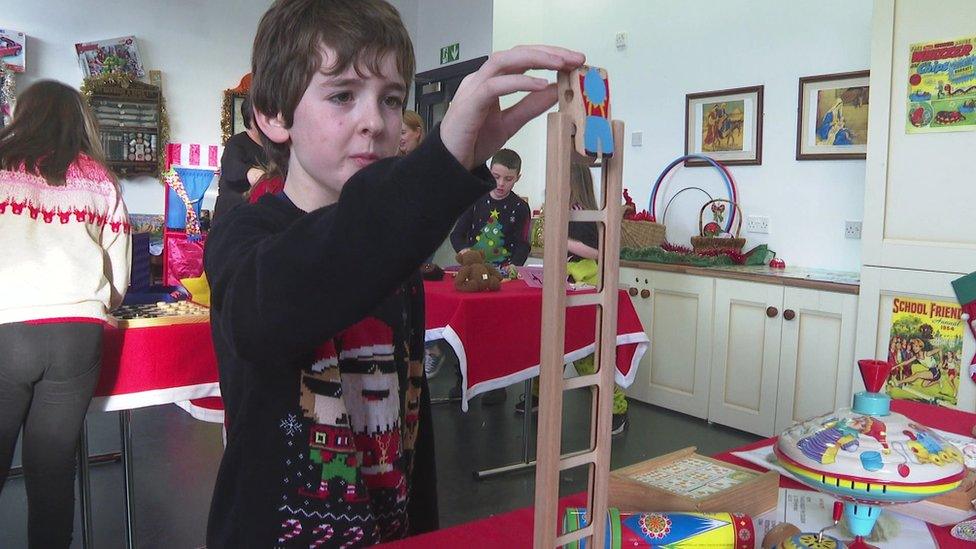Christmas: Would old toys make it onto lists today?
- Published

In some ways, toys haven't changed that much over the years, organisers say
From balls and dolls to electronics and virtual reality, Christmas toys and traditions have changed dramatically over the years.
This year an initiative at Newry Museum is giving local primary school children an insight into how Christmas was celebrated in years gone by.
So, would any of the old toys make it onto this year's Christmas lists?
"I'm asking for a dog, but if my mum finds out I'm going to be dead," said Dromintee Primary School pupil Aaron.
He was among more than 600 schoolchildren to try out the old toys and learn about traditions at the museum in December.
On the Christmas lists of P6 pupils at Dromintee Primary School in south Armagh, there is a mix of electronics, arts, footballs, farming toys, bikes, scooters and even early requests for make-up.
For some, including Áine, the lure of Lego remains strong.
"I like it because it's challenging and you get to build it," she said.
"You don't have to follow instructions, you can make it yourself."
For James: "There's a make called Britains and it's my favourite make - they make good strong tractors but I'd like an electric dirt bike this year."
Newry Museum shows primary school children how Christmas was celebrated in years gone by.
But what about the toys of the past?
In the museum toy room, Conor has been playing with a Tumble Down the Ladder type toy.
"You just have to put this little dude up here and you let go and then he climbs down," he said.
Asked if it's the type of toy he'd like, a simple "yes" is the answer.
Across the room, Sadbh is playing with a wooden puzzle where different animals can be made with assorted shapes.
"To make the dinosaur, you put this piece here then another to make the neck," she said.
"You have to put all the pieces together to make the shapes. It's like a jigsaw but with shapes that don't fully fit together.
"Ours [modern toys] are a bit different, better, but I think they are both pretty good."
'The art of play is still the same'
According to Noelle Frew from the museum, while toys have changed over the years, they haven't really changed that much.
"They are very different but very similar," she said.
"We have little wooden dolls that children would have played with when this building was a castle 500 years ago. They are very simple.

Noelle Frew from the museum, says toys haven't really changed that much over the years
"Now children still play with dolls but they are more imaginative and are made of plastic.
"The art of play is still the same; it is very interesting to see.
"We have a range of children from P1 to P7. The older ones would spend a lot of time on devices but they'd come in here and enjoy playing and interacting with the older toys and discovering play again."
The exhibition allows children to see where traditions come from, Declan Carroll, from the museum, said.

The exhibition allows children to see where traditions come from, Declan Carroll, from the museum, said.
"Some things have changed enormously and some things have changed very little.
"Our modern Christmas comes from the Victorians around 170 years ago - things like Christmas cards and trees - but the celebration at this time of year obviously goes back much further."

Some toys today are very different to their older counterparts
So, how will the pupils of Dromintee Primary School spend Christmas this year?
"I go downstairs and wait for all my family to come down and once we all get down we open our presents," said Holly.
"Then we play with them for a bit, then our family comes over and I help make the Christmas dinner."

Ferghal has two favourite things about Christmas.
"Christmas Day and the Tuesday before Christmas when I go down to the market to buy calves," he said.
Sticking to traditions
As for their school staff, teacher Mrs O'Hagan's traditions include doing the vegetables for Christmas Day dinner on Christmas Eve, then going to Christmas Eve Mass "and really getting the excitement going".
Mrs Matthews also likes to keep things traditional, but wonders if times are changing.
"Things are quite similar now - I think it's still about families and families getting together and we still try to do that," she said.
"We try and stick to the older traditions. I don't know how that will be for the younger ones coming down the line."
Time will tell and perhaps one day the toys and traditions of today will make their own museum exhibition.